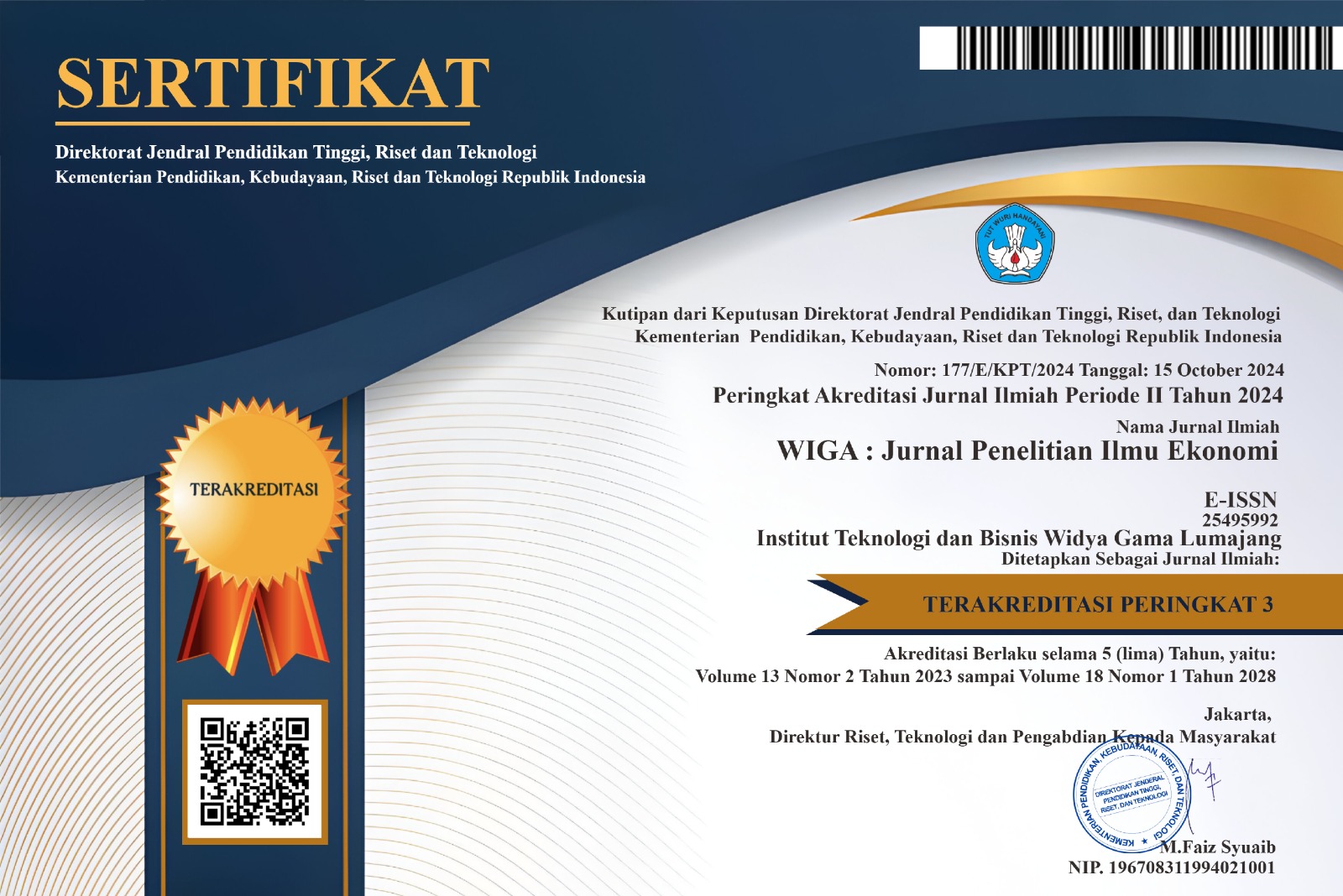Analysis of Employee Performance Improvement: The Role of Social Exchange Theory
Keywords:
Employee Performance, Organizational Support, TrainingAbstract
This study aims to examine and analyze the important role of organizational support and training in an effort to improve the performance of Bandung City Transportation Department employees. Organizational support is measured through the dimensions of caring, consideration, problem solving assistance, and the ability to forgive mistakes, while training is measured through training needs, planning, and evaluation. The sample used was 116 employees of the Bandung City Transportation Department. Analysis using multiple linear regression. The results of the analysis show that organizational support and training have a positive and significant impact on employee performance in the aspects of quality, quantity, timeliness and responsibility. The implication is that the transportation agency can consider developing stronger organizational support and optimizing appropriate training programs to improve operational efficiency and effectiveness. Future research could explore other factors that influence employee performance in broader and more diverse contexts.
Downloads
References
Arifin, Z., Nirwanto, N., & Manan, A. (2020). Reducing the Negative Bullying at Work Impact on Employee Performance through Absorption and Team Work. Advances in Economics, Business and Management Research, 64, 885-892. https://doi.org/10.2991/piceeba2-18.2019.79
Astutik, M., & Suhermin. (2022). Job Satisfaction as Mediation: Job Environment on Employee Performance. 2nd International Conference on Business and Social Sciences, Surabaya, Indonesia.
Blau, P. M. (1964). Exchange and power in social life. Wiley.
Chen, T., Hao, S., Ding, K., Feng, X., Li, G., & Liang, X. (2020). The impact of organizational support on employee performance. Employee Relations: The International Journal, 42(1), 166-179. https://doi.org/10.1108/er-01-2019-0079
Guterresa, L. F. D. C., Armanu, A., & Rofiaty, R. (2020). The role of work motivation as a mediator on the influence of education-training and leadership style on employee performance. Management Science Letters, 10, 1497-1504. https://doi.org/10.5267/j.msl.2019.12.017
Hadi, S., Putra, A. R., & Mardikaningsih, R. (2020). Pengaruh Perilaku Inovatif Dan Keterlibatan Kerja Terhadap Kinerja Karyawan. Jurnal Baruna Horizon, 3(1), 186-197. https://doi.org/10.52310/jbhorizon.v3i1.38
Hikmawati, F. (2020). Metodologi Penelitian. Rajawali Pers.
Marques-Quinteiro, P., Vargas, R., Eifler, N., & Curral, L. (2018). Employee adaptive performance and job satisfaction during organizational crisis: the role of self-leadership. European Journal of Work and Organizational Psychology, 28(1), 85-100. https://doi.org/10.1080/1359432x.2018.1551882
Rachmadona, Irawati, I., & Sugandi, Y. S. (2022). Kinerja Bidang Manajemen Transportasi Dan Parkir Pada Dinas Perhubungan Dalam Mengatasi Kemacetan Di Kota Bandung. JANE (Jurnal Administrasi Negara), 13(2), 203-209. https://doi.org/10.24198/jane.v13i2.28694
Rehman, S.-u., Mohamed, R., & Ayoup, H. (2019). The mediating role of organizational capabilities between organizational performance and its determinants. Journal of Global Entrepreneurship Research, 9(1), 30. https://doi.org/10.1186/s40497-019-0155-5
Rizki, V. L., & Sulistyan, R. B. (2022). Manajemen Sumber Daya Manusia. Widya Gama Press.
Roloff, M. E. (2015). Social Exchange Theories. The International Encyclopedia of Interpersonal Communication, 1-19. https://doi.org/10.1002/9781118540190.wbeic0158
Sudaryono. (2018). Metodologi Penelitian. PT. RajaGrafindo Persada.
Sulistyan, R. B. (2020). Lecturer E-learning Training: The Role of Social Exchange Theory. Empowerment Society, 3(2), 50-56. https://doi.org/10.30741/eps.v3i2.589
Sulistyan, R. B., Carito, D. W., Cahyaningati, R., Taufik, M., Kasno, K., & Samsuranto, S. (2022). Identification of Human Resources in the Application of SME Technology. Wiga : Jurnal Penelitian Ilmu Ekonomi, 22(1), 70-76. https://doi.org/10.30741/wiga.v12i1.799
Sulistyan, R. B., & Ermawati, E. (2020). Explaining Cyberloafing Behavior: The Role of General Strain Theory. Wiga : Jurnal Penelitian Ilmu Ekonomi, 10(2), 148-156. https://doi.org/10.30741/wiga.v10i2.596
Sulistyan, R. B., Lukiana, N., & Ato’illah, M. (2022). Perencanaan Co-Working Space dalam Peningkatan SDM di Kabupaten Lumajang. Jurnal Abdi Masyarakat Indonesia (JAMSI), 2(1), 243-248. https://doi.org/10.54082/jamsi.207
Sulistyan, R. B., Paramita, R. W. D., Setyobakti, M. H., Rizal, N., & Lukiana, N. (2020). Perceived Organizational Support on Employee Performance: The Mediating Effect of Job Stress. Proceedings of the 1st International Conference on Social Science, Humanities, Education and Society Development. https://doi.org/10.4108/eai.13-10-2020.2303710
Utrilla, P. V. N.-C., Grande-Torraleja, F. A., Albarracin, A. L. M., & Ortega-Rodriguez, C. (2022). Advance employee development to increase performance of the family business. Employee Relations: The International Journal, 45(7), 27-45. https://doi.org/10.1108/er-03-2022-0151
www.cnnindonesia.com. (2023). Biang Macet di Bandung: Jumlah Kendaraan Hampir Sama Populasi Penduduk. CNN Indonesia. https://www.cnnindonesia.com/otomotif/20230210194658-579-911677/biang-macet-di-bandung-jumlah-kendaraan-hampir-sama-populasi-penduduk
Zaeni, N., Arfah, A., & Semmaila, B. (2022). The Effect of Compensation and Work Environment on Employee Performance. Point of View Research Management, 3(2), 161-173.
Zega, Y. (2022). Pengaruh Kinerja Kepegawaian Dalam Administrasi Perkantoran. Jurnal Akuntansi, Manajemen dan Ekonomi, 1(1), 63-69. https://doi.org/10.56248/jamane.v1i1.14
Zia-ur-Rehman, M., Ansari, R. H., & Ali, H. (2020). Impact of Training on Employees' Performance. Global Management Sciences Review, 5(3), 120-128. https://doi.org/10.31703/gmsr.2020(V-III).13
Published
Versions
- 2023-09-29 (3)
- 2023-09-29 (1)
How to Cite
Issue
Section
License
Copyright (c) 2023 Ginanjar Wira Saputra, Kurniawati, Ahmad Johan, Riza Sulistyan

This work is licensed under a Creative Commons Attribution-NonCommercial 4.0 International License.










